外研社初二英语下册Module 9知识精讲
外研版八年级英语下册Module9Friendship知识点讲解
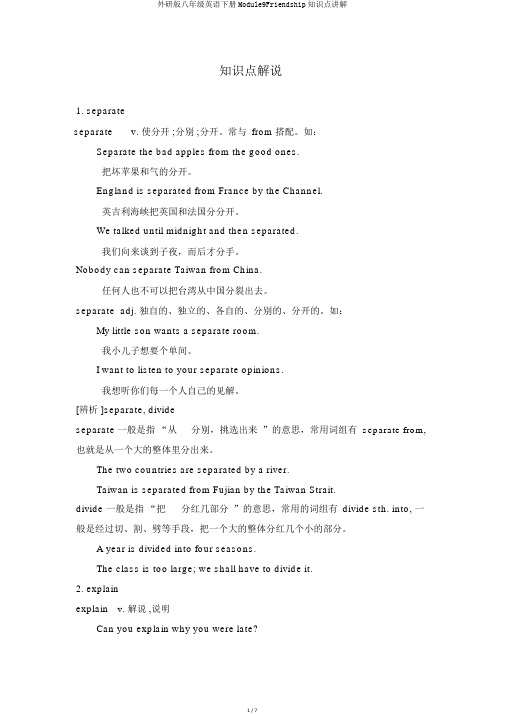
知识点解说1. separateseparate v. 使分开 ;分别 ;分开。
常与 from 搭配。
如:Separate the bad apples from the good ones.把坏苹果和气的分开。
England is separated from France by the Channel.英吉利海峡把英国和法国分分开。
We talked until midnight and then separated.我们向来谈到子夜,而后才分手。
Nobody can separate Taiwan from China.任何人也不可以把台湾从中国分裂出去。
separate adj. 独自的、独立的、各自的、分别的、分开的。
如:My little son wants a separate room.我小儿子想要个单间。
I want to listen to your separate opinions.我想听你们每一个人自己的见解。
[辨析 ]separate, divideseparate一般是指“从分别,挑选出来”的意思,常用词组有separate from, 也就是从一个大的整体里分出来。
The two countries are separated by a river.Taiwan is separated from Fujian by the Taiwan Strait.divide 一般是指“把分红几部分”的意思,常用的词组有divide sth. into, 一般是经过切、割、劈等手段,把一个大的整体分红几个小的部分。
A year is divided into four seasons.The class is too large; we shall have to divide it.2. explainexplain v. 解说 ,说明Can you explain why you were late?你能解说一下你为何迟到吗?He explained his plan in detail.他认真地说了然自己的计划。
Module 9课文知识点总结(含语法)-外研版八年级下册英语
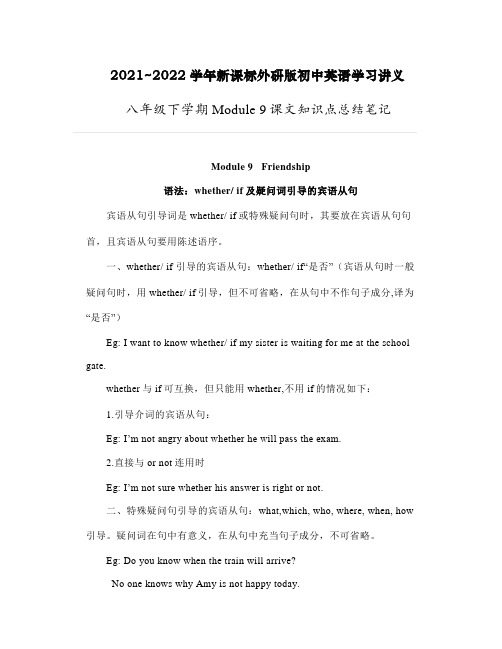
2021~2022学年新课标外研版初中英语学习讲义八年级下学期Module 9课文知识点总结笔记Module 9 Friendship语法:whether/ if及疑问词引导的宾语从句宾语从句引导词是whether/ if或特殊疑问句时,其要放在宾语从句句首,且宾语从句要用陈述语序。
一、whether/ if 引导的宾语从句:whether/ if“是否”(宾语从句时一般疑问句时,用whether/ if引导,但不可省略,在从句中不作句子成分,译为“是否”)Eg: I want to know whether/ if my sister is waiting for me at the school gate.whether与if可互换,但只能用whether,不用if的情况如下:1.引导介词的宾语从句:Eg: I’m not angry about whether he will pass the exam.2.直接与or not连用时Eg: I’m not sure whether his answer is right or not.二、特殊疑问句引导的宾语从句:what,which, who, where, when, how 引导。
疑问词在句中有意义,在从句中充当句子成分,不可省略。
Eg: Do you know when the train will arrive?No one knows why Amy is not happy today.三、that引导的宾语从句,可以省略。
Eg: I hope (that) it will rain tomorrow.1.be in 在家 be out 外出2.at the moment = now 现在3.请某人接电话的日常用语:(1)Hello! May/ Could I speak to…?(2)Hello! Is… in?(3)Is that … (speaking)?(4)Hello! I’d like to speak to…(5)Hello! This is …. May I have a word with…?接电话人的应答语:(1)Hello! This is … (speaking)(2)Who’s that?(3)Who’s that speaking?(4)Is that… speaking?告诉对方他/她找的人不在,请稍等的用语:Hold on (for a moment), please.4.take a message 捎口信leave a message 留言message(Cn.) “音信”一般指口头传递的或书写的“消息”news (Un.) “新闻”一般指通过广播、电视、报纸等新闻媒体发布的最新消息informatio n(Un.) “信息”一般指在阅读、观察、谈话或书信往来中关注的消息资料等5.have a problem with与…之间有问题;与…之间产生矛盾avoid problems with避免与…产生矛盾6.best friend 最好的朋友7.get separated 分开(终止性动词)= be separated(延续性动词)Eg: They can’t live without each other and they will never separate.他们相依为命,永不分离。
外研版八年级下册Module 9知识点整理
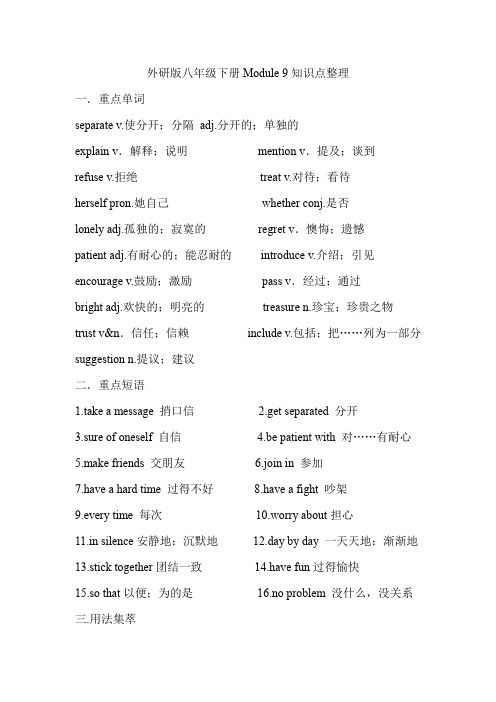
外研版八年级下册Module 9知识点整理一.重点单词separate v.使分开;分隔adj.分开的;单独的explain v.解释;说明mention v.提及;谈到refuse v.拒绝treat v.对待;看待herself pron.她自己whether conj.是否lonely adj.孤独的;寂寞的regret v.懊悔;遗憾patient adj.有耐心的;能忍耐的introduce v.介绍;引见encourage v.鼓励;激励pass v.经过;通过bright adj.欢快的;明亮的treasure n.珍宝;珍贵之物trust v&n.信任;信赖include v.包括;把……列为一部分suggestion n.提议;建议二.重点短语1.take a message 捎口信2.get separated 分开3.sure of oneself 自信4.be patient with 对……有耐心5.make friends 交朋友6.join in 参加7.have a hard time 过得不好8.have a fight 吵架9.every time 每次10.worry about担心11.in silence安静地;沉默地12.day by day 一天天地;渐渐地13.stick together团结一致14.have fun过得愉快15.so that以便;为的是16.no problem 没什么,没关系三.用法集萃1.refuse to do sth.拒绝做某事2.regret doing sth.后悔做过某事3. encourage sb. to do sth鼓励某人做某事4.be afraid to do sth害怕做某事;不敢做某事5.feel sb.do sth感觉某人做过(或经常做)某事四.重点句型1. Could I ask if you've mentioned this to her? 我可以问一下你是否向她提及过此事吗?2.1 was very lonely, and afraid to make friends with anyone.我很孤独,不敢与任何人交朋友。
外研版英语八年级下册module 9重点知识归纳
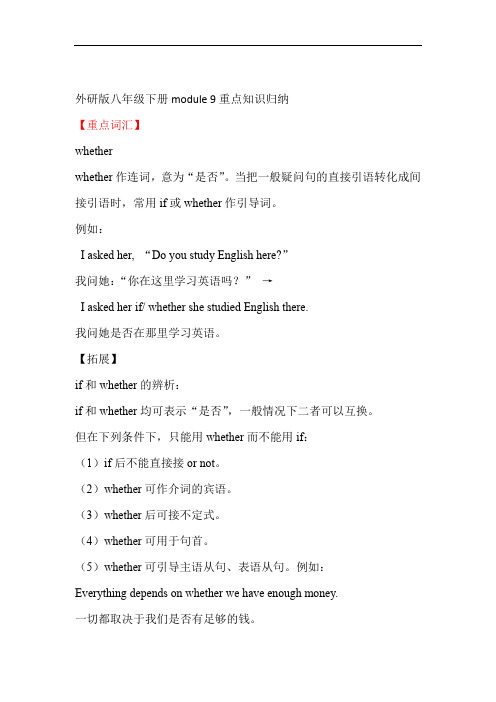
外研版八年级下册module 9重点知识归纳【重点词汇】whetherwhether作连词,意为“是否”。
当把一般疑问句的直接引语转化成间接引语时,常用if或whether作引导词。
例如:I asked her, “Do you study English here?”我问她:“你在这里学习英语吗?”→I asked her if/ whether she studied English there.我问她是否在那里学习英语。
【拓展】if和whether的辨析:if和whether均可表示“是否”,一般情况下二者可以互换。
但在下列条件下,只能用whether而不能用if:(1)if后不能直接接or not。
(2)whether可作介词的宾语。
(3)whether后可接不定式。
(4)whether可用于句首。
(5)whether可引导主语从句、表语从句。
例如:Everything depends on whether we have enough money.一切都取决于我们是否有足够的钱。
正确与否,我不知道。
n't know. Whether it is right or wrong, I doIt doesn't matter whether he will come or not. 他来不来没关系。
treattreat作动词,意为“治疗;对待;看待”。
例如:The dentist is treating my teeth. 牙医正在治疗我的牙齿。
Marry treats me as one of the family. 玛丽对待我就像家人一样。
【拓展】treatment是treat的名词形式,意为“对待;待遇;治疗”时常用搭配有:medical treatment 药物治疗;hospital treatment 住院治疗。
separate(1)separate作形容词,意为“单独的;分开的”。
Module9知识点讲解课件2021-2022学年外研版英语八年级下册
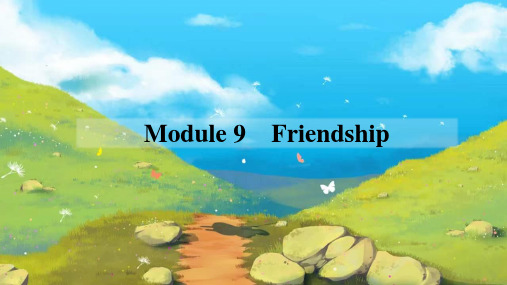
(patient)with students.
8.The tourists had waited at the airport for two hours.
They were getting impatient (patient).
9.Susan never gets upset when she has to wait in line. She is very D .
5、be patient with sb. 对某人有耐心, patient是形容词,意为“有耐心的;能忍耐的”。 例句: So be patient with her and explain to her that she can make friends with your other friends too. 所以对她要有耐心,并且向她说明她也可以和你的其他朋友交朋友。 We should be patient with them. 我们应该对他们有耐心。
1.我后悔和我妈妈吵架了,就向她道歉了。 I regretted arguing with my mother and said sorry to her. 2.—Did you talk back to your mother when you were a child? —Yes. But now I realize I was wrong. I really regret C that silly thing to my mum. A.do B.to do C.doing D.did
1.He asked Mr Wang to explain (解释)the maths problem carefully. 2.Can you explain (解释)it again? I don't understand it. 3.Can you explain (解释) to me how to do this math problem?
外研版八年级下册Module9知识点讲解
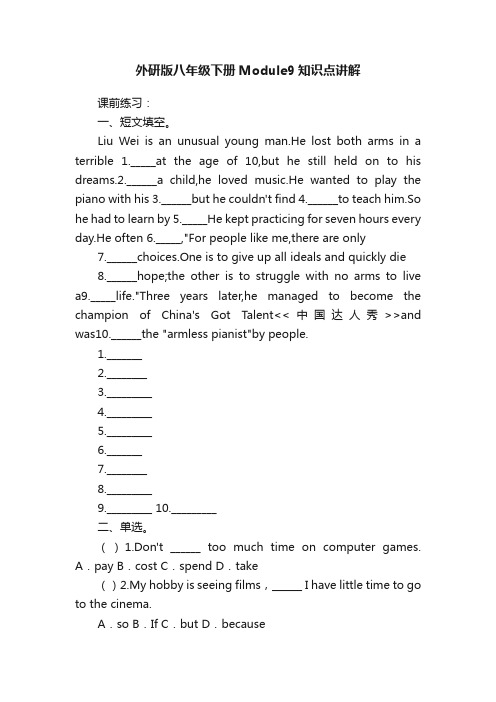
外研版八年级下册Module9知识点讲解课前练习:一、短文填空。
Liu Wei is an unusual young man.He lost both arms in a terrible 1._____at the age of 10,but he still held on to his dreams.2.______a child,he loved music.He wanted to play the piano with his 3.______but he couldn't find 4.______to teach him.So he had to learn by 5._____He kept practicing for seven hours every day.He often 6._____,"For people like me,there are only7.______choices.One is to give up all ideals and quickly die8.______hope;the other is to struggle with no arms to live a9._____life."Three years later,he managed to become the champion of China's Got Talent<<中国达人秀>>and was10.______the "armless pianist"by people.1._______2.________3._________4._________5._________6._______7.________8._________9._________ 10._________二、单选。
外研英语8下Module9知识梳理
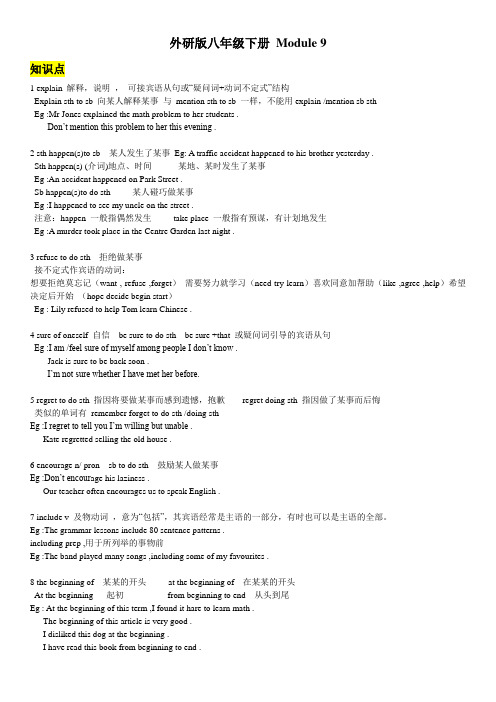
外研版八年级下册Module 9知识点1 explain 解释,说明,可接宾语从句或“疑问词+动词不定式”结构Explain sth to sb 向某人解释某事与mention sth to sb 一样,不能用explain /mention sb sthEg :Mr Jones explained the math problem to her students .Don’t mention this problem to her this evening .2 sth happen(s)to sb 某人发生了某事Eg: A traffic accident happened to his brother yesterday .Sth happen(s) (介词)地点、时间某地、某时发生了某事Eg :An accident happened on Park Street .Sb happen(s)to do sth 某人碰巧做某事Eg :I happened to see my uncle on the street .注意:happen 一般指偶然发生take place 一般指有预谋,有计划地发生Eg :A murder took place in the Centre Garden last night .3 refuse to do sth 拒绝做某事接不定式作宾语的动词:想要拒绝莫忘记(want , refuse ,forget)需要努力就学习(need try learn)喜欢同意加帮助(like ,agree ,help)希望决定后开始(hope decide begin start)Eg : Lily refused to help Tom learn Chinese .4 sure of oneself 自信be sure to do sth be sure +that 或疑问词引导的宾语从句Eg :I am /feel sure of myself among people I don’t know .Jack is sure to be back soon .I’m not sure whether I have met her before.5 regret to do sth 指因将要做某事而感到遗憾,抱歉regret doing sth 指因做了某事而后悔类似的单词有remember forget to do sth /doing sthEg :I regret to tell you I’m willing but unable .Kate regretted selling the old house .6 encourage n/ pron sb to do sth 鼓励某人做某事Eg :Don’t encour age his laziness .Our teacher often encourages us to speak English .7 include v 及物动词,意为“包括”,其宾语经常是主语的一部分,有时也可以是主语的全部。
Module9复习重点 外研版英语八年级下册
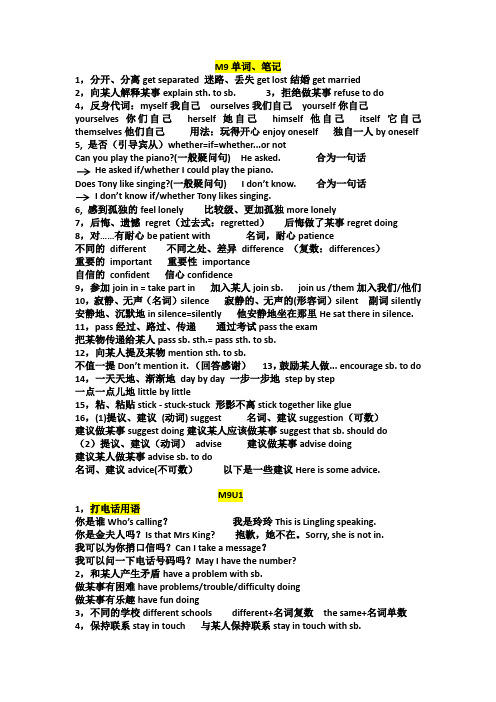
M9单词、笔记1,分开、分离get separated 迷路、丢失get lost结婚get married2,向某人解释某事explain sth. to sb. 3,拒绝做某事refuse to do4,反身代词:myself我自己ourselves我们自己yourself你自己yourselves你们自己herself她自己himself他自己itself它自己themselves他们自己用法:玩得开心enjoy oneself 独自一人by oneself 5, 是否(引导宾从)whether=if=whether...or notCan you play the piano?(一般疑问句) He asked. 合为一句话He asked if/whether I could play the piano.Does Tony like singing?(一般疑问句) I don’t know. 合为一句话I don’t know if/whether Tony likes singing.6, 感到孤独的feel lonely 比较级、更加孤独more lonely7,后悔、遗憾regret(过去式:regretted)后悔做了某事regret doing8,对……有耐心be patient with 名词,耐心patience不同的different 不同之处、差异difference (复数:differences)重要的important 重要性importance自信的confident 信心confidence9,参加join in = take part in 加入某人join sb. join us /them加入我们/他们10,寂静、无声(名词)silence 寂静的、无声的(形容词)silent 副词silently 安静地、沉默地in silence=silently 他安静地坐在那里He sat there in silence. 11,pass经过、路过、传递通过考试pass the exam把某物传递给某人pass sb. sth.= pass sth. to sb.12,向某人提及某物mention sth. to sb.不值一提Don’t mention it. (回答感谢)13,鼓励某人做... encourage sb. to do 14,一天天地、渐渐地day by day 一步一步地step by step一点一点儿地little by little15,粘、粘贴stick - stuck-stuck 形影不离stick together like glue16,(1)提议、建议(动词) suggest 名词、建议suggestion(可数)建议做某事suggest doing建议某人应该做某事suggest that sb. should do(2)提议、建议(动词)advise 建议做某事advise doing建议某人做某事advise sb. to do名词、建议advice(不可数)以下是一些建议Here is some advice.M9U11,打电话用语你是谁Who’s calling?我是玲玲This is Lingling speaking.你是金夫人吗?Is that Mrs King? 抱歉,她不在。
八年级英语module 9外研社知识精讲
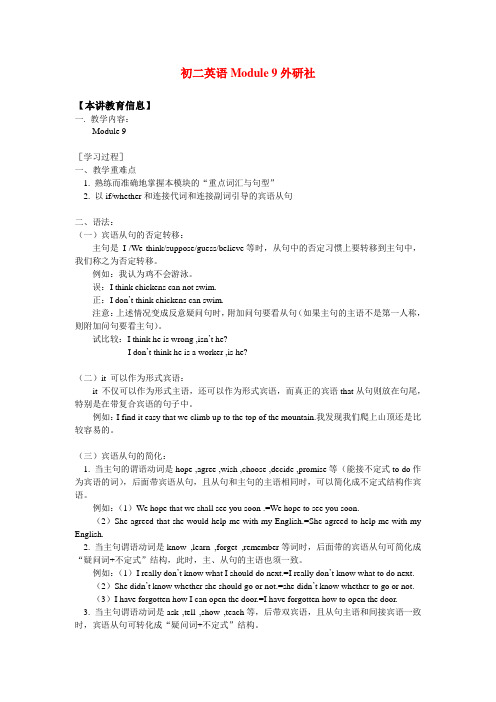
初二英语Module 9外研社【本讲教育信息】一. 教学内容:Module 9[学习过程]一、教学重难点1. 熟练而准确地掌握本模块的“重点词汇与句型”2. 以if/whether和连接代词和连接副词引导的宾语从句二、语法:(一)宾语从句的否定转移:主句是I /We think/suppose/guess/believe等时,从句中的否定习惯上要转移到主句中,我们称之为否定转移。
例如:我认为鸡不会游泳。
误:I think chickens can not swim.正:I don’t think chickens can swim.注意:上述情况变成反意疑问句时,附加问句要看从句(如果主句的主语不是第一人称,则附加问句要看主句)。
试比较:I think he is wrong ,isn’t he?I don’t think he is a worker ,is he?(二)it 可以作为形式宾语:it 不仅可以作为形式主语,还可以作为形式宾语,而真正的宾语that从句则放在句尾,特别是在带复合宾语的句子中。
例如:I find it easy that we climb up to the top of the mountain.我发现我们爬上山顶还是比较容易的。
(三)宾语从句的简化:1. 当主句的谓语动词是hope ,agree ,wish ,choose ,decide ,promise等(能接不定式to do作为宾语的词),后面带宾语从句,且从句和主句的主语相同时,可以简化成不定式结构作宾语。
例如:(1)We hope that we shall see you soon .=We hope to see you soon.(2)She agreed that she would help me with my English.=She agreed to help me with my English.2. 当主句谓语动词是know ,learn ,forget ,remember等词时,后面带的宾语从句可简化成“疑问词+不定式”结构,此时,主、从句的主语也须一致。
外研版八年级下册英语-M9

外研版⼋年级下册英语-M9龙⽂教育⼀对⼀个性化辅导教案M9 Friendship ⼀、课前热⾝⼆、内容讲解知识点⼀、单词讲解hold v.拿;举;持;拥有【巧记提⽰】 h+old (⽼的;旧的)【经典例句】 Could you hold on? I’ll just see if the manager’s in.你不要挂断电话好吗?我去看⼀看经理在不在。
【考点聚焦】 1) hold的过去式和过去分词是:held,held2) hold on(打电话时⽤语)请等⼀下,不要挂上。
3) Hold the line.指“不挂断电话,等⼀下”。
if conj.如果;是否【巧记提⽰】 if(如果)→is(是)【经典例句】 If you ask him,he will help you.如果你向他请求,他会帮助你。
【考点聚焦】 1) if作“如果”讲时,引导的是条件状语从句。
注意时态要⽤“主将从现”(主句将来时,从句⼀般现在时)。
2)if作“是否”讲时,引导的是宾语从句。
whether conj.是否【巧记提⽰】 whether (是否)→ weather (天⽓)【经典例句】 I don’t know whether I will succeed.我不知道我是否会成功。
【考点聚焦】同⾳词:weather n.天⽓personal adj.私⼈的;个⼈的【巧记提⽰】 person (n.⼈)→(personal (adj.私⼈的)【经典例句】 May I ask you some personal questions?我可以问你⼀些私⼈的问题吗?【考点聚焦】 1)反义词:public adj.公共的扩展词:personality n.个性;⼈格;⼈物public adj.公共的;公众的【经典例句】 Most children go to public elementary and secondary schools.⼤多数孩⼦上的是公⽴⼩学和公⽴中学。
外研社初二英语下册Module 9知识精讲
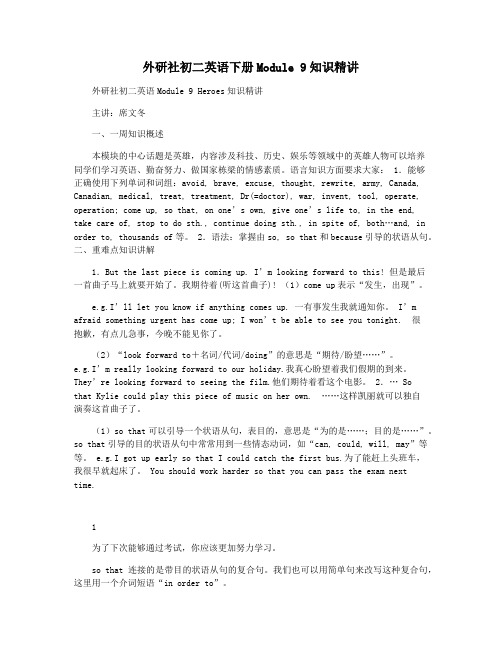
外研社初二英语下册Module 9知识精讲外研社初二英语Module 9 Heroes知识精讲主讲:席文冬一、一周知识概述本模块的中心话题是英雄,内容涉及科技、历史、娱乐等领域中的英雄人物可以培养同学们学习英语、勤奋努力、做国家栋梁的情感素质。
语言知识方面要求大家: 1.能够正确使用下列单词和词组:avoid, brave, excuse, thought, rewrite, army, Canada, Canadian, medical, treat, treatment, Dr(=doctor), war, invent, tool, operate, operation; come up, so that, on one’s own, give one’s life to, in the end, take care of, stop to do sth., continue doing sth., in spite of, both…and, in order to, thousands of等。
2.语法:掌握由so, so that和because引导的状语从句。
二、重难点知识讲解1.But the last piece is coming up. I’m looking forward to t his! 但是最后一首曲子马上就要开始了。
我期待着(听这首曲子)! (1)come up表示“发生,出现”。
e.g.I’ll let you know if anything comes up. 一有事发生我就通知你。
I’m afraid something urgent has come up; I won’t be able to see you tonight. 很抱歉,有点儿急事,今晚不能见你了。
(2)“look forward to+名词/代词/doing”的意思是“期待/盼望……”。
- 1、下载文档前请自行甄别文档内容的完整性,平台不提供额外的编辑、内容补充、找答案等附加服务。
- 2、"仅部分预览"的文档,不可在线预览部分如存在完整性等问题,可反馈申请退款(可完整预览的文档不适用该条件!)。
- 3、如文档侵犯您的权益,请联系客服反馈,我们会尽快为您处理(人工客服工作时间:9:00-18:30)。
外研社初二英语Module 9 Heroes知识精讲主讲:席文冬一、一周知识概述本模块的中心话题是英雄,内容涉及科技、历史、娱乐等领域中的英雄人物可以培养同学们学习英语、勤奋努力、做国家栋梁的情感素质。
语言知识方面要求大家:1.能够正确使用下列单词和词组:avoid, brave, excuse, thought, rewrite, army, Canada, Canadian, medical, treat, treatment, Dr(=doctor), war, invent, tool, operate, operation; come up, so that, on one’s own, give one’s life to, in the end, take care of, stop to do sth., continue doing sth., in spite of, both…and, in order to, thousands of等。
2.语法:掌握由so, so that和because引导的状语从句。
二、重难点知识讲解但是最后一首曲子马上就要开始了。
我期待着(听这首曲子)!(1)come up表示“发生,出现”。
e.g.I’ll let you know if anything comes up. 一有事发生我就通知你。
I’m afraid something urgent has come up; I won’t be able to see you tonight.很抱歉,有点儿急事,今晚不能见你了。
(2)“look forward to+名词/代词/doing”的意思是“期待/盼望……”。
e.g.I’m really looking forward to our holiday.我真心盼望着我们假期的到来。
They’re looking forward to seeing the film.他们期待着看这个电影。
……这样凯丽就可以独自演奏这首曲子了。
(1)so that可以引导一个状语从句,表目的,意思是“为的是……;目的是……”。
so that 引导的目的状语从句中常常用到一些情态动词,如“can, could, will, may”等等。
e.g.I got up early so that I could catch the first bus.为了能赶上头班车,我很早就起床了。
You should work harder so that you can pass the exam next time.为了下次能够通过考试,你应该更加努力学习。
so that连接的是带目的状语从句的复合句。
我们也可以用简单句来改写这种复合句,这里用一个介词短语“in order to”。
e.g.I get up early so that I can catch the early bus.我起床早以便能赶上早班公共汽车。
=I get up early in order to catch the early bus.so…that意为“如此……以致”,引导结果状语从句。
so后接形容词或副词原形。
e.g.He runs so fast that nobody can catch up with him.他跑得如此之快,以致没有人追得上他。
They study so hard that they are the best in the class.他们学习如此努力,以致他们的成绩是班上最好的。
The problem so difficult that nobody can work it out in my class.这么题目这么难以致于我们班没人会做。
(2)on one’s own表示“独立地,单独地;独自地”。
e.g.I made this bookshelf all on my own.这个书架是我自己做的。
She’s been living on her own for ten years.她独自生活已有10年了。
两个人都站起来,因为两个人都要演奏。
because conj.因为。
because作为从属连词,用以引导原因状语从句时,其后应是一个不含有引导词的句子。
e.g.I do it because I like it. 我做这件事是因为我喜欢。
I am late because the traffic is too bad. 因为交通阻塞今天我迟到了。
because从句通常用来说明一个直接的原因,引导一个原因状语从句,这时主从句可改成由so连接的并列句。
e.g.I can’ go with you today because I’m too busy.=I’m too busy today, so I can’t go with you.今天我不能跟你一块去,因为我太忙了。
We all like the little girl because she’s very beautiful and clever.=The little girl is very beautiful and clever, so we all like her.我们都喜欢那个小女孩,因为她非常漂亮,聪明。
注意:汉语中可以说“因为……所以……”,但英语中如用了because就不能再用so,用了so就不能再用because。
拓展:because of是介词,其后接名词、代词或动名词。
She cried because of what you said.她哭是因为你说的话。
I am late because of the bad traffic.因为交通阻塞今天我迟到了。
我想她这么做是为了避免凯丽和她的父母之间产生矛盾。
(1)imagine vt.想象,设想,猜想,料想①imagine + n./ pron.e.g.You can not imagine their surprise at hearing the news.你不能想象听了这消息他们多么惊讶。
②imagine + doing sth.e.g.Can you imagine living without electricity? 你能想象没有电的生活吗?Mary can’t imagine (her) marrying a man of that sort玛丽难以想象(她)嫁给那种男人后的情形。
③imagine +从句e.g.You can’t imagine how I missed you all.你不能想象我多么想念你们大家。
(2)avoid vt. 避免;消除;逃避(后接名词或动名词,也就是-ing形式)e.g.Are you trying to avoid me? 你是不是想躲开我?She avoids making me feel stupid.她避免使我感到傻乎乎的。
He walked round the house to avoid meeting me.他绕过房子避开我。
我打赌萨莉会获胜,因为她才是今晚真正的英雄!I bet.表示“我敢肯定;我相信。
”e.g.I bet you’ll never guess who I saw this morning.I bet that he’s forgotten my birthday again.You bet.表示“的确;当然。
”e.g.—Are you coming to the party? 你会来参加晚会吗?—You bet (=Certainly)! 当然会!give one’s life to sth. /doing表示“捐躯,献身”。
e.g.He gave his life to saving the rare wild animals. 他献身于挽救珍稀野生动物。
A lot of heroes gave their lives to their country.许多英雄为他们的祖国献出生命。
为了能挽救许许多多的生命,他努力地工作。
(1)thousands of 成千上万的(thousands 前不加具体的数目,是个概数。
)e.g.Thousands of workers took part in the strike. 成千上万的工人参加了罢工。
There are thousands of students in our school. 我们学校有成千上万的学生。
类似用法:hundreds of, millions of, dozens of等。
基数词作定语用时,一律不用复数形式。
e.g.There are two thousand workers in the car factory.这家汽车工厂有2, 000多人。
(不说two thousands workers)(2)save one’s life表示“挽救某人的生命”。
e.g.The man jumped into the river and saved the boy’s life.那个人跳进河中,救了男孩儿一命。
Thanks for helping me with my car—you saved my life.谢谢你帮我修车,真是救了我一命。
(这里是比喻用法)有一次,他连续做了69个小时的手术,挽救了112个人。
without在该句中为介词,意思是“没……”,后面如果接动词,动词则要用-ing形式。
e.g.The girl left the party without saying goodbye.女孩儿没有道别就离开了晚会。
You shouldn’t drive for more than three hours without taking a break.你不能连续开车三个多小时而不休息一下。
尽管在做手术过程中割破了手,但他仍然继续工作。
(1)continue doing sth./ continue to do sth (无区别) 继续做某事e.g.Other students hope to continue studying after finishing school.其他学生希望毕业后继续学习。
She continued to play (playing) the piano.她继续弹钢琴。
He continued working in the field, though it’s dark.尽管天黑了,他仍然继续在地里劳动。
(2)in spite of表示“尽管,不顾”。
In spite of a bad storm, the plane landed safely. 尽管遇到了暴风雨,飞机还是安全着陆了。
